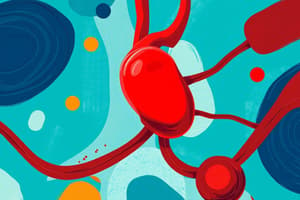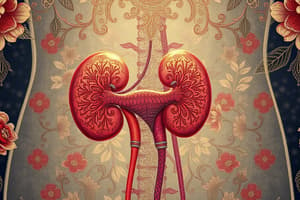Podcast
Questions and Answers
Thiazide diuretics increase water reabsorption in the body.
Thiazide diuretics increase water reabsorption in the body.
False (B)
Beta-blockers work by increasing the heart's pumping action.
Beta-blockers work by increasing the heart's pumping action.
False (B)
If extracellular fluid increases, the kidneys reduce the excretion of water and sodium.
If extracellular fluid increases, the kidneys reduce the excretion of water and sodium.
False (B)
Decrease in extracellular fluid leads to a decrease in blood pressure, prompting the kidneys to retain water and sodium.
Decrease in extracellular fluid leads to a decrease in blood pressure, prompting the kidneys to retain water and sodium.
ACE inhibitors reduce aldosterone levels in the body.
ACE inhibitors reduce aldosterone levels in the body.
Diuretics are usually not recommended as a first-line treatment for high blood pressure.
Diuretics are usually not recommended as a first-line treatment for high blood pressure.
Many hypertensive medications act by decreasing water and sodium excretion.
Many hypertensive medications act by decreasing water and sodium excretion.
Chronic renal disease is the most common cause of secondary hypertension.
Chronic renal disease is the most common cause of secondary hypertension.
Primary Hypertension is not common and usually requires specialized care.
Primary Hypertension is not common and usually requires specialized care.
Adrenal primary hyperaldosteronism is not a cause of secondary hypertension.
Adrenal primary hyperaldosteronism is not a cause of secondary hypertension.
A 20mm Hg increase in diastolic pressure above normal does not affect cardiovascular risk.
A 20mm Hg increase in diastolic pressure above normal does not affect cardiovascular risk.
High potassium intake is a risk factor for hypertension.
High potassium intake is a risk factor for hypertension.
Treatment options for hypertension rely solely on short-term mechanisms.
Treatment options for hypertension rely solely on short-term mechanisms.
The renin-angiotensin-aldosterone system is an example of a humoral or neurohormonal mechanism that contributes to the control of blood pressure.
The renin-angiotensin-aldosterone system is an example of a humoral or neurohormonal mechanism that contributes to the control of blood pressure.
The cardiovascular center transmits parasympathetic impulses to the heart through the spinal cord.
The cardiovascular center transmits parasympathetic impulses to the heart through the spinal cord.
Epinephrine is a sympathetic neurotransmitter that directly stimulates vagal tone, heart rate, and contractility.
Epinephrine is a sympathetic neurotransmitter that directly stimulates vagal tone, heart rate, and contractility.
Humoral mechanisms play no role in regulating blood pressure.
Humoral mechanisms play no role in regulating blood pressure.
Neural mechanisms are mainly involved in long-term regulation of blood pressure.
Neural mechanisms are mainly involved in long-term regulation of blood pressure.
Study Notes
- Hypertension is defined as sustained abnormal elevation of arterial blood pressure to maintain constant blood flow to vital organs.
- Hypertension is managed through short-term and long-term mechanisms.
- Short-term mechanisms include neural and humoral mechanisms.
- Neural mechanisms are controlled by the cardiovascular center through the autonomic nervous system.
- Humoral mechanisms involve the renin-angiotensin-aldosterone system and vasopressin.
- Secondary hypertension accounts for less than 10% of cases and is caused by underlying diseases.
- Common causes of secondary hypertension include chronic renal disease, obesity, diabetes mellitus, and coarctation of the aorta.
- Chronic renal disease compromises blood pressure regulating systems, leading to hypertension and damage to target organs.
- Hypertension damages the kidneys, brain, heart, eyes, and extremities.
- Management of hypertension includes medications like diuretics, beta-blockers, and ACE inhibitors.
- Diuretics rid the body of excess water and salt.
- Beta-blockers block the effects of adrenaline and ease heart pumping.
- ACE inhibitors reduce angiotensin II and aldosterone levels.
- Hypertension is a risk factor for coronary artery disease, congestive heart failure, stroke, and renal failure.
- Risk factors for hypertension include age, alcohol consumption, sedentary lifestyle, low potassium intake, family history, smoking, and NSAID use.
- Primary hypertension, or essential hypertension, is the most common form of hypertension and managed in primary care practices.
Studying That Suits You
Use AI to generate personalized quizzes and flashcards to suit your learning preferences.
Description
Learn about the definition of hypertension, types, mechanisms regulating blood pressure, and various treatment options available. Understand the importance of controlling blood pressure for the proper functioning of vital organs.



